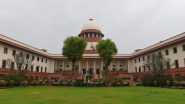New Delhi, Sep 16 (PTI) The Municipal Corporation of Delhi (MCD) on Monday said it has conducted over 2.59 crore household visits, identifying and destroying mosquito breeding sites in 1,56,932 homes, amid a rise in vector-borne diseases in the national capital.
Delhi registered its first dengue death of the year after a 54-year-old man died at Lok Nayak Hospital last week, officials said on Sunday.
The civic body has intensified efforts to prevent and control the spread of dengue, malaria, and chikungunya by implementing a multi-pronged strategy, an official statement said. Over 4.20 lakh houses have been sprayed and fogged with insecticides to combat the spread of the virus through adult mosquitoes, it added.
"Over 2.59 crore households have been visited, with 1,56,932 found to be breeding mosquito sites. Breeding sites are destroyed on the spot, and homeowners are educated on health and hygiene practices," the statement read.
"MCD is committed to taking proactive measures to protect the citizens of Delhi from vector-borne diseases. Rooftops, balconies, and courtyards of many homes and buildings were found filled with rainwater, serving as breeding grounds. These areas must be cleaned by the owners," the MCD stated.
According to the agency, regular spraying of insecticides is being carried out weekly in drains, water bodies, and surface water collections using manual and motorized sprayers. As part of biological control measures, larvivorous fish have been introduced at 213 locations with clean water collections.
The MCD has also conducted 23 special drives in vulnerable areas such as police stations, construction sites, parks, hospitals, schools, government offices, and DTC depots. Special fogging operations have been carried out in Kavad Camps, Krishna Janmashtami pandals or temples, and Lal Quila (IDC-2024). Low-lying areas along railway tracks are also sprayed using power spray tankers mounted on railway wagons.
In addition, the MCD has held 28 Inter-Sectoral Coordination Committee meetings at the headquarters and zonal levels, involving major stakeholders such as the DDA, DJB, Delhi Police, PWD, CPWD, Horticulture, IFC, ASI, and the Education Department, it said.
These meetings, chaired by Mayor Shelly Oberoi band Commissioner Ashwani Kumar aim to ensure effective coordination and implementation of vector-borne disease control measures.
Furthermore, modal teachers in all schools have been trained to prevent mosquito breeding on school premises, the statement read.
Looking ahead, the MCD plans to intensify fogging and focal spray operations during public gatherings and religious festivals. Outdoor fogging operations will be increased in September and October, depending on mosquito density and the disease situation. Anti-larval measures will be ramped up on public land, and legal actions such as notices, challans, and administrative charges will be imposed on repeat offenders, according to the statement.
Under the provisions of the Malaria and Other Vector-Borne Diseases Bye-Laws under the DMC Act, 97,397 legal notices, 32,384 challans, and 7,929 administrative charges have already been levied by the civic body so far. Police complaints will also be filed against defaulters who allow repeated mosquito breeding, the statement said.
(This is an unedited and auto-generated story from Syndicated News feed, LatestLY Staff may not have modified or edited the content body)













 Quickly
Quickly
















